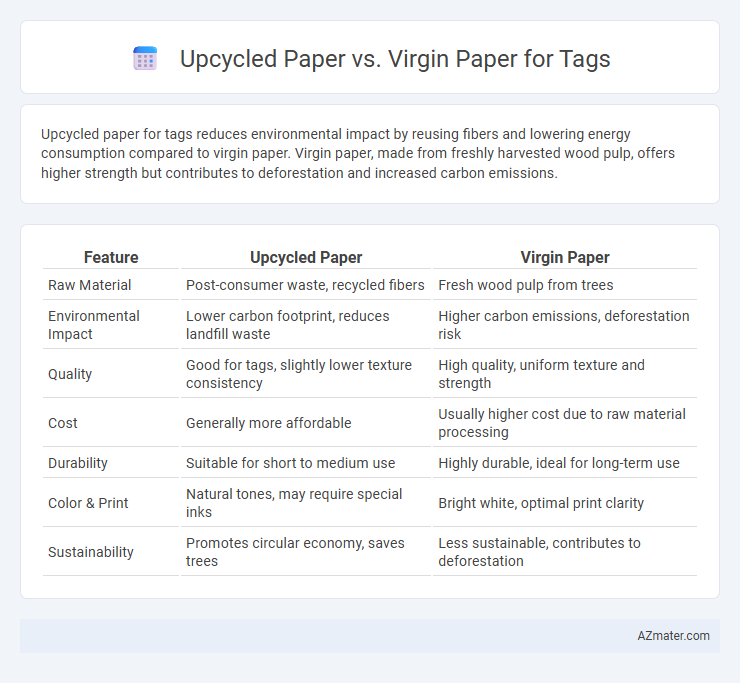Upcycled paper for tags reduces environmental impact by reusing fibers and lowering energy consumption compared to virgin paper. Virgin paper, made from freshly harvested wood pulp, offers higher strength but contributes to deforestation and increased carbon emissions.
Table of Comparison
| Feature | Upcycled Paper | Virgin Paper |
|---|---|---|
| Raw Material | Post-consumer waste, recycled fibers | Fresh wood pulp from trees |
| Environmental Impact | Lower carbon footprint, reduces landfill waste | Higher carbon emissions, deforestation risk |
| Quality | Good for tags, slightly lower texture consistency | High quality, uniform texture and strength |
| Cost | Generally more affordable | Usually higher cost due to raw material processing |
| Durability | Suitable for short to medium use | Highly durable, ideal for long-term use |
| Color & Print | Natural tones, may require special inks | Bright white, optimal print clarity |
| Sustainability | Promotes circular economy, saves trees | Less sustainable, contributes to deforestation |
Introduction to Upcycled vs Virgin Paper for Tags
Upcycled paper for tags is made from recycled materials, reducing environmental impact by conserving natural resources and lowering energy consumption compared to virgin paper. Virgin paper is produced from freshly harvested wood pulp, offering higher strength and a smoother surface but contributing to deforestation and greater carbon emissions. Choosing upcycled paper supports sustainable practices while maintaining quality suitable for everyday tag production needs.
What is Upcycled Paper?
Upcycled paper is crafted from post-consumer or post-industrial paper waste, transforming discarded materials into new, functional paper products while reducing the demand for virgin wood pulp. This sustainable practice minimizes environmental impact by conserving trees, lowering energy consumption, and decreasing landfill waste compared to traditional virgin paper production. Tags made from upcycled paper often retain quality and durability, making them an eco-friendly alternative for branding and labeling needs.
Understanding Virgin Paper: Definition and Properties
Virgin paper is produced directly from freshly harvested wood pulp, offering superior strength, uniform texture, and brighter appearance compared to upcycled paper. Its fibers are longer and less contaminated, resulting in enhanced durability and print quality, ideal for tags requiring a premium finish. The higher energy and resource consumption in virgin paper production contrasts with the eco-friendliness of upcycled alternatives.
Environmental Impact: Upcycled Paper vs Virgin Paper
Upcycled paper tags significantly reduce environmental impact by repurposing existing fibers, lowering deforestation rates, and minimizing energy consumption compared to virgin paper tags made from freshly harvested trees. Virgin paper production involves intensive use of water, chemicals, and energy, contributing to higher carbon emissions and greater habitat disruption. Choosing upcycled paper tags supports sustainable resource use and decreases landfill waste through recycling and waste reduction efforts.
Cost Comparison: Upcycled vs Virgin Paper Tags
Upcycled paper tags typically offer a cost advantage over virgin paper tags due to lower material expenses and reduced processing requirements. Virgin paper involves higher production costs linked to raw pulp extraction, energy consumption, and chemical treatments, resulting in elevated prices for tags. Businesses seeking budget-friendly, sustainable alternatives often prefer upcycled paper tags, balancing cost efficiency with eco-friendly practices.
Quality and Durability of Tag Materials
Upcycled paper tags offer eco-friendly benefits but often lack the consistent strength and durability of virgin paper tags, which are made from fresh fibers that provide a smoother surface and higher tear resistance. Virgin paper tags maintain better print quality and hold up more effectively under wear and tear, making them ideal for long-term use or products requiring clear branding. Tags made from virgin paper also resist moisture and bending more efficiently, ensuring lasting visual appeal and structural integrity.
Aesthetic Differences: Texture and Finish
Upcycled paper for tags features a rougher texture and natural fiber variations, giving each tag a unique, rustic aesthetic that appeals to eco-conscious consumers. Virgin paper offers a smoother, more uniform finish ideal for high-definition printing and vibrant colors, enhancing brand visibility and design precision. The choice between these papers impacts not only environmental sustainability but also the tactile and visual presentation of product tags.
Brand Image and Consumer Perception
Upcycled paper tags significantly enhance brand image by showcasing a commitment to sustainability and environmental responsibility, attracting eco-conscious consumers. Consumers increasingly perceive upcycled paper tags as a symbol of ethical branding, which fosters trust and loyalty toward the brand. Virgin paper tags, while often associated with quality and durability, may convey less environmental concern, potentially impacting consumer preferences in markets focused on green initiatives.
Industry Trends: Upcycled Paper Adoption
The adoption of upcycled paper for tags is rapidly increasing within sustainable packaging trends, driven by rising consumer demand for eco-friendly products. Industry reports highlight a 30% annual growth rate in upcycled paper usage due to its lower environmental impact compared to virgin paper, which involves extensive resource extraction. Leading brands are integrating upcycled paper tags to reduce carbon footprints and appeal to environmentally conscious markets, signaling a shift towards circular economy practices in packaging.
Conclusion: Choosing the Right Paper for Tags
Upcycled paper for tags offers significant environmental benefits by reducing waste and conserving resources, making it an eco-friendly choice for sustainable branding. Virgin paper provides superior strength, smoothness, and print quality, ideal for high-end tags requiring durability and vibrant designs. Selecting the right paper depends on balancing eco-conscious goals with performance needs, where upcycled paper suits green credentials and virgin paper excels in premium presentation.

Infographic: Upcycled paper vs Virgin paper for Tag
 azmater.com
azmater.com